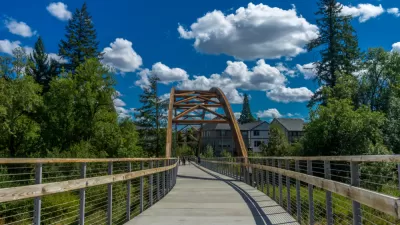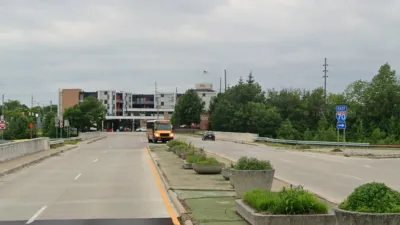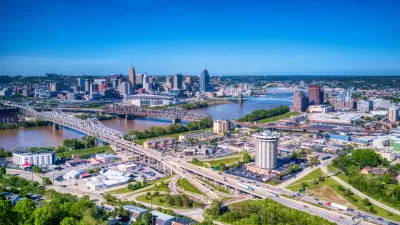A new grant program launched by the Oregon Department of Transportation (ODOT) aims to fill a key gap in the funding available for bike and pedestrian paths.

"The Oregon Department of Transportation has taken the wraps off a new program that will fund off-street path projects across the state," reports Jonathan Maus.
The Oregon Community Paths program, as the new funding program is called, could offer around $19.2 million between federal and state sources through 2024, although that total is subject to some fluctuation depending on budget tightening connected to the economic depression caused by the pandemic.
"ODOT will pull together four funding sources — one from the federal government, three from the State of Oregon — to help plan and construct paths that are not on the roadway right-of-way," according to Maus. "That stipulation is important because Highway Trust Fund, gas tax, and nearly every other major revenue source is legally required to be spent in the right-of-way."
So, for example, safe routes to school that potentially use paths that are not on the roadway, exempted from Highway Trust Fund spending, would be able to seek funding from the new Oregon Community Paths program, according to Maus.
Maus provides additional details on the four kinds of funding fueling the new program, as well as the project types that will be eligible to apply for the new funding. The program website includes more details about the funding schedule. Webinars providing more information about the program are scheduled for August 21 and September 18.
FULL STORY: ODOT says new Community Paths grant program could dish out over $19 million

Maui's Vacation Rental Debate Turns Ugly
Verbal attacks, misinformation campaigns and fistfights plague a high-stakes debate to convert thousands of vacation rentals into long-term housing.

Planetizen Federal Action Tracker
A weekly monitor of how Trump’s orders and actions are impacting planners and planning in America.

San Francisco Suspends Traffic Calming Amidst Record Deaths
Citing “a challenging fiscal landscape,” the city will cease the program on the heels of 42 traffic deaths, including 24 pedestrians.

Defunct Pittsburgh Power Plant to Become Residential Tower
A decommissioned steam heat plant will be redeveloped into almost 100 affordable housing units.

Trump Prompts Restructuring of Transportation Research Board in “Unprecedented Overreach”
The TRB has eliminated more than half of its committees including those focused on climate, equity, and cities.

Amtrak Rolls Out New Orleans to Alabama “Mardi Gras” Train
The new service will operate morning and evening departures between Mobile and New Orleans.
Urban Design for Planners 1: Software Tools
This six-course series explores essential urban design concepts using open source software and equips planners with the tools they need to participate fully in the urban design process.
Planning for Universal Design
Learn the tools for implementing Universal Design in planning regulations.
Heyer Gruel & Associates PA
JM Goldson LLC
Custer County Colorado
City of Camden Redevelopment Agency
City of Astoria
Transportation Research & Education Center (TREC) at Portland State University
Jefferson Parish Government
Camden Redevelopment Agency
City of Claremont





























